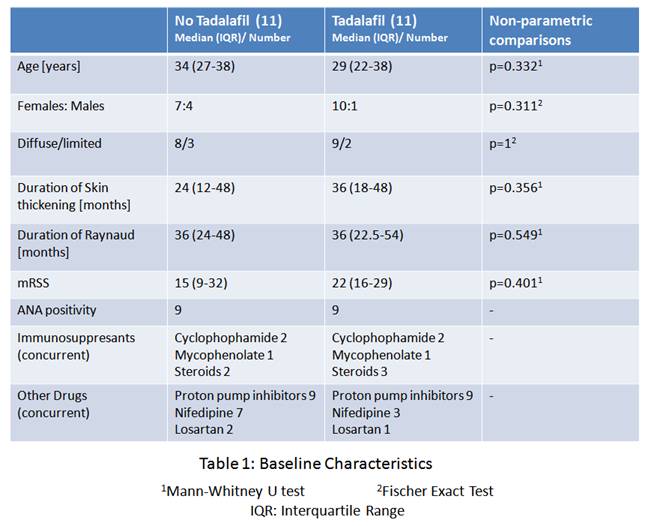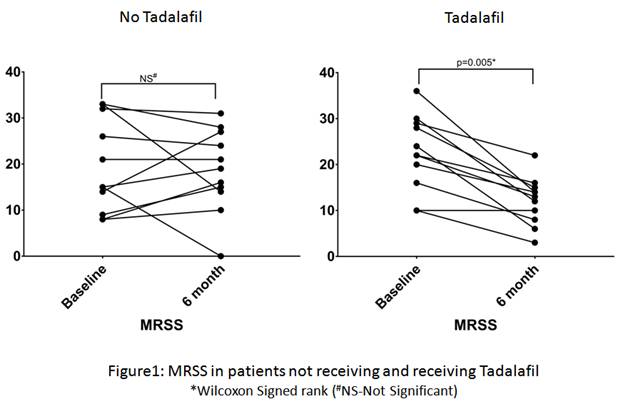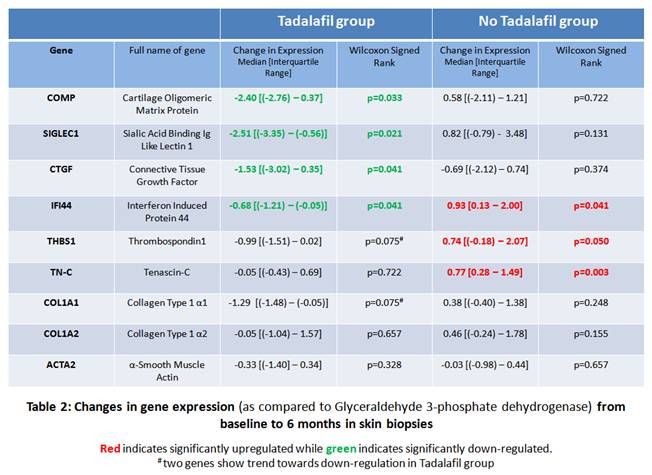Session Information
Date: Tuesday, November 7, 2017
Title: Systemic Sclerosis, Fibrosing Syndromes and Raynaud's – Clinical Aspects and Therapeutics II
Session Type: ACR Concurrent Abstract Session
Session Time: 4:30PM-6:00PM
Background/Purpose:
Currently, drugs that modify skin fibrosis in Systemic Sclerosis (SSc) have efficacy in certain subgroups of patients only. Phosphodiesterase-5 inhibitors (PDE5i) are known to reduce fibrosis in Peyronie’s disease and renal fibrosis. We studied the efficacy of Tadalafil, a long acting PDE5i, in reducing the skin fibrosis in SSc.
Methods:
In this prospective open-labeled study, 24 patients meeting ACR 2013 classification criteria for systemic sclerosis were recruited. Twelve received Tadalafil in addition to standard of care whereas the rest were continued on standard of care. Demographic and clinical details including Modified Rodnan Skin Score (MRSS) were recorded at baseline and at 6 months. Paired forearm skin biopsies of 5mm diameter were taken at baseline and at 6 months. Expression of profibrotic genes COMP, THBS1, SIGLEC1, IFI44, TN-C, COL1A1, COL1A2, ACTA2 and CTGF [Abbreviations in Table 2] in skin biopsies were compared to housekeeping gene GAPDH using real time polymerase chain reaction.
Results:
Baseline characteristics were similar in both the groups [Table 1]. One patient was lost to follow-up in each group. Amongst patients on Tadalafil, median mRSS decreased from 22 to 13 (p= 0.005) whereas median mRSS in the other group had a statistically non-significant increase from 15 to 19 (p=1) at 6 months [Figure 1].
In the Tadalafil group, there was decrease in the expression of COMP, SIGLEC1, CTGF and IFI44 that was statistically significant (Table 2). In the other group, there was significant increase in the expression of IFI44, THBS1 and TN-C that was absent in the Tadalafil group. Overall change in mRSS (ΔmRSS) correlated with change in SIGLEC1, IFI44, TBHS1 and COL1A1 (Spearman; p<0.05).
Conclusion:
Tadalafil significantly reduced the skin fibrosis in SSc with down-regulation or prevention of upregulation (or both) in 6 of the 9 pro-fibrotic genes tested.
To cite this abstract in AMA style:
Ahmed S, Rai MK, Misra DP, Agarwal V. Tadalafil Reduces Skin Fibrosis and Profibrotic Genes Expression in Patients with Systemic Sclerosis [abstract]. Arthritis Rheumatol. 2017; 69 (suppl 10). https://acrabstracts.org/abstract/tadalafil-reduces-skin-fibrosis-and-profibrotic-genes-expression-in-patients-with-systemic-sclerosis/. Accessed .« Back to 2017 ACR/ARHP Annual Meeting
ACR Meeting Abstracts - https://acrabstracts.org/abstract/tadalafil-reduces-skin-fibrosis-and-profibrotic-genes-expression-in-patients-with-systemic-sclerosis/



